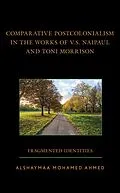Comparative Postcolonialism in the Works of V.S. Naipaul and Toni Morrison: Fragmented Identities begins with an overview of its theoretical framework, highlighting the intersectional relationship between postcolonial literature and comparative literature. Tracing selected novels by Naipaul and Morrison, the book takes, as a starting point, Fanon's three-phase journey of the decolonizing process. In the first phase of mimicry, Naipaul's and Morrison's earlier novels represent the assimilation of indigenous people into dominant hegemonic cultures. The second phase is envisioned as the re-narration or re-interpretation of the past and old legends of indigenous culture. Morrison succeeds in asserting that her ancestors' past is the only way to celebrate a cultural identity, but Naipaul tends to criticize and neglect his past and his original, indigenous culture. The third phase marks the emergence of a revolutionary literature, in which Naipaul and Morrison guide their people to hybridity as a new way of becoming and resisting the hegemonic dichotomies in dominant societies.
Autorentext
Alshaymaa Mohamed Ahmed is assistant professor of English and comparative literature in the humanities department, College of Language and Communication, Arab Academy for Science Technology and Maritime, (AAST) Cairo, Egypt.
